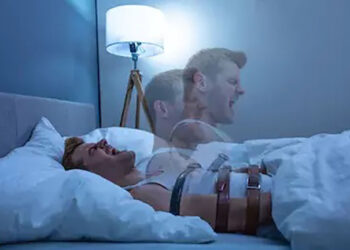
Are you finding it hard to sleep well at night? When did you start noticing it? How much sleep are you currently able to get at night? Let me walk you through some ways to overcome insomnia without relying too much on medications.
Insomnia is defined as difficulty either falling or staying asleep that is accompanied by daytime impairments related to those sleep troubles[1]American Academy of Sleep Medicine. (2014). The International Classification of Sleep Disorders – Third Edition (ICSD-3). Darien, IL.. It has become a relatively common condition affecting over 20 per cent of people in the United States. About 68% of Americans (an estimated 164 million people) have been reported to have problems with sleep at least once a week.[2]Why Americans Can’t Sleep – Consumer Reports
A similar study among 82,055 Chinese University students in 2016 showed that 23.8% of respondents found it hard to initiate sleep, and 25.5% had inadequate sleep less than 6 hours a day[3]Lu, li et al. (2017). Sleep Duration and Sleep Patterns in Chinese University Students: A Comprehensive Meta-Analysis. Journal of Clinical Sleep Medicine: JCSM.
Also, the healthcare cost related to insomnia was estimated to be $41 billion in 2015 with a predicted to rise to $52 billion by 2020. In 2020, Americans spent over $830 million on melatonin sleep supplements alone[4]Ibid. Why Americans Can’t Sleep.
If the cost of sleep medications is that expensive, wouldn’t it be great to know about ways to get good sleep without any medications? A lot of sleep problems are related to lifestyle factors. Sleep hygiene helps you to modify those factors and get good quality sleep daily.
Benefits of Sleep
Sleep has lots of benefits for health and productivity. Here are some benefits of sleep and why you need to learn about the sleep hygiene to improve your quality of sleep.
- Sleep keeps your heart healthy
- Sleep reduces stress
- Sleep enhances memory
- Sleep can help control weight gain
- Sleep may reduce the risk of depression
- Sleep helps your brain clean up
- Sleep helps the body heals
- Sleep can help maximize athletic performance
- Sleep reduces the risk of stroke, heart disease, and cancer
- Sleep enhances your immunity
- Sleep reduces inflammation
- Sleep enhances your emotions and social interactions
- Adequate sleep enhances your productivity.
Understanding the Causes of Insomnia
The causes of lack of sleep or insomnia can be categorised into the several groups: secondary to a medical condition, psychological causes, drug-related, stress-related causes, breathing-related, etc.
Acute or chronic medical conditions like febrile illness, respiratory tract infections, hypertension, heart failure, diabetes, can affect the quality and quantity of a person’s sleep resulting in insomnia. Psychological causes are primary sleep disorders affecting the neurochemical regulation of sleep in the brain, e.g stress.
Some prescription drugs and substance use can also affect sleep. For example, caffeine-containing medications can cause a lack of sleep in people taking them. Stress alters the body’s hormonal balance because stress-induced body hormones can affect the sleep-wake cycle.
Sleep Hygiene: Practical Ways To Overcome Insomnia
The sleep hygience focuses on modifying lifestyle, stress, and environment-related causes of insomnia which many people fail to take account of. Not every sleep problem requires you to take medications. Trying sleep hygiene is a good place to start.
Sleep hygiene does not require taking any medications, rather it has a set of dos and don’ts that can help you fall asleep faster and get a more refreshing sleep. It includes the following:
The Dos of Sleep Hygiene
1. Adequate physical activity during the day
Physical activity during the day helps you set you in the mood for sleep. Regular physical activity helps to increase circulation to skeletal muscles, and affords you a more refreshing sleep at night.
2. Observe a regular sleep routine
Sleep routine has to do with when you go to bed and when you wake up everyday. Having a sleep routine helps to tell your body about what time it needs to log off and what time it needs to wake. This is a very effective sleep hygiene component, and it also has a neurohormonal explanation.
3. Eating a lighter and high-fat content meal at dinner
Eating too heavy meal at dinner can make you feel bloated and heavy when you lie down to sleep, while high-fat diet ensures a sustainable supply of energy throughout the night. Carbohydrates food typically give less energy compared to fats, meaning you have to eat much of them, which can lead to bloating when you lie down to sleep.
4. Sleeping in a quiet, dark and well-ventilated bedroom
The importance of sleeping in a quiet, dark and well-ventilated bedroom cannot be over-emphasized. Noise and excess light stimulates the brain to wake up from sleep by affecting the part known as the Reticular Activating System (RAS). While a poorly ventilated bedroom makes you uncomfortable while you sleep, further reducing your threshold for waking up.
5. Good mattress and bedding
If you are having problem sleep, it is a good idea to work on the condition of your bed and mattress. If your beddings are damp, or your bed is wrapped with a noisy cellophane, these can affect your sleep quality. Get a soft mattress with dry hypoallergenic bed materials, and a good pillow.
6. Finish all tasks before going to bed
You don’t want to go to bed with things you are still worrying about. This can make you fall deep into your thoughts and you might never be able to sleep easily. You need to finish up your tasks before going to bed to avoid thinking about what you have not done. But even if you don’t finish everything, you have to tell yourself that you have done all you need to do for that day.
7. Listening to calm soothing music
A calm soothing music has been found to be an effective sleep aid for most people. Good music helps you focus your brain away from other sleep-disrupting thoughts, and has also been shown to help people struggling with sleep paralysis.
The Don’ts of Sleep Hygiene
1. Avoid sleeping during the day
Sleeping too much during the day alters your sleep-wake cycle and can make it more difficult for you to fall asleep during your routine bed time.
2. Avoiding food and drinks containing caffeine
Caffeine is a stimulant found in coffee and kola that keeps you awake when consumed. To get good quality sleep, you should avoid taking caffeine-containing foods or drinks close to evening, especially when you are struggling with insomnia.
3. Avoid using mobile devices in bed
Mobile phones come with distractions and disruptions to good sleep. They keep you busy and unable to sleep. The light from the screen can also interfere with your sleep regulation system, and the sound can also affect your sleep latency, that is the time it takes to fall asleep. If you struggling to find sleep, keeping your phone aside is one thing you also need to try.
4. Avoiding alcohol consumption
Alcohol can alter your sleep cycle. While it may have an initial sedative effect, it can lead to significant restlessness and sleeplessness much later. Alcohol consumption has been associated with a reduction in the Rapid Eye Movement (REM) stage of sleep, and can also exacerbate sleep-related breathing issues in insomnia causes by obstructive sleep apnea.
5. Avoid congestion or sleeping with a snoring person
While snoring can affect your quality of sleep, snoring in someone else can also affect your sleep. The noise may affect sleep initiation at the early stage when sleep is not yet deep. If you are struggling to find sleep, it will be best to sleep in a different room from a snoring person.
Other Ways to Treat Insomnia
Sleep hygiene may not address any specific medical cause of sleep. It only modifies lifestyle factors that may affect the quality of sleep. If after trying the above sleep hygiene measures and your insomnia persists, here are some additional things to consider.
1. Sleep medications (for short-term only)
You could try over-the-counter sleep medications if your insomnia persists. They may be able to help you get sleep. Example of some helpful sleep medications include diphenhydramine (Benadryl or Sominex – an antihistamine drug), and doxylamine (Unisom – another antihistamine drug).
Benzodiazepines like diazepam, Zolpidem and Zoleplox are also effective in the treatment of insomnia.
These over-the-counter and prescription sleep medications are useful but they can have serious side effects if taken for a long time, not exceeding one to two weeks[5]Drugs with anticholinergic properties, cognitive decline, and dementia in an elderly general population: the 3-city study – PMC. Another reason why you should not take them for too long is that you want to be able to know if the insomnia is caused by some other medical condition.
2. See a doctor
A doctor will evaluate you to identify the underlying cause of your insomnia and treat it. Your doctor will also take a look at your previous medications and modify them if necessary.
Asides from lifestyle and environmental factors, sleepless can also be caused by lung and heart problems, depression and other psychiatric conditions, obstructive urinary disease, even perimenopause, and so on. Your doctor will detect any of these conditions, if present, and offer a more lasting solution to your insomnia.
3. Cognitive Behavioral Therapy (CBT)
Cognitive Behavioural Therapy (CBT) is a specialized intervention that can be prescribed by a sleep specialist if the insomnia does not respond to other medications. It does not involve any medications but is a systematic process of modifying someone’s behaviour and response to environmental condition using psychiatric tools and methods.
If sleeplessness is caused by anxiety, phobia, or Post-traumatic Stress Disorder, CBT can be effective. Due to it’s effectiveness, CBT has been considered the gold standard for treating insomnia.
Conclusion
Sleep hygiene refers to non-drug measures for treating insomnia. It is a simple but effective way to treat insomnia and it involves a set of dos and don’ts as discussed above.
When sleep hygiene doesn’t work, it is recommended to go for better alternatives like trying sleep medications for a short period or seeing your doctor who would prescribe medications, counsel you on sleep hygiene, or commence CBT sessions for you.
References
| ↑1 | American Academy of Sleep Medicine. (2014). The International Classification of Sleep Disorders – Third Edition (ICSD-3). Darien, IL. |
|---|---|
| ↑2 | Why Americans Can’t Sleep – Consumer Reports |
| ↑3 | Lu, li et al. (2017). Sleep Duration and Sleep Patterns in Chinese University Students: A Comprehensive Meta-Analysis. Journal of Clinical Sleep Medicine: JCSM |
| ↑4 | Ibid. Why Americans Can’t Sleep |
| ↑5 | Drugs with anticholinergic properties, cognitive decline, and dementia in an elderly general population: the 3-city study – PMC |

















